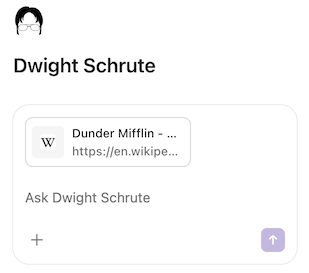Private Beta
Building, testing, and publishing agents are only available to a limited set of developers at this time.
The following documentation provides an early preview of the SDK, and the specifics are subject to change.
Context provided to your agent¶
While tools must be invoked by the LLM, context is provided automatically. All skills are provided context by default, with no additional configuration required.
Screen context¶
The agent has access to the information on the screen, including the text and URL of the web page currently open. The chat box includes a visual indicator for users about the context being passed, and users can remove that context for a given session.

There are three types of text your agent may receive, with possibly more than one being passed at the same time:
- Screen information
-
The text visible on the screen. The Superhuman Go platform decides which elements of the web page to include, usually limiting it to core content and excluding navigational elements, etc.
Full text not guaranteed
The agent will always include the text that is visible on the user's screen (and often much more), but you can't assume it's the full text of the page, doc, etc. The amount of text passed to your agent can be capped for performance reasons, and many apps implement "lazy loading," rendering content only as it comes into view.
- Editor text
- If the user is currently typing in an editable text field, the current value of that field. It is split into numbered paragraphs, which are referenced by the Rewrite tool.
- Selected text
- If the user has selected some text with their cursor, the value of that text.
You can reference this content in your prompts using the terms above.
pack.addSkill({
name: "HaikuGenerator",
displayName: "Make a haiku",
description: "Make a haiku poem from the content on screen.",
prompt: `
Write a haiku poem based on the screen information.
If there is selected text, make sure those words are included.
`,
tools: [],
});
No formatting or visual elements are passed to the agent; only the plain-text equivalent.
User information¶
The agent is provided with the user's full name and email address. This can be useful for personalizing responses, filtering search results, etc.
Not proof of identity
We don't recommend using the email address as proof of the user's identity, as the LLM may not faithfully pass the value to a formula. If you need to verify the user's identity, we recommend using a supported Authentication mechanism and having the user connect their account during agent installation.
Chat history¶
An agent has access to previous messages in the current chat session, both those sent by the user and those sent by the agent. Message history from other chat sessions is not available.
Date and time¶
When an agent is invoked, it's provided the current date and time, up to the minute (no seconds). It's also given the user's timezone, so time values can be localized correctly.